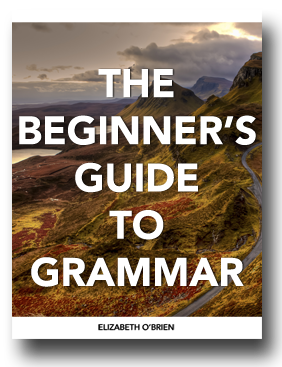Download your free grammar guide here.
Download your free grammar guide here.
What are noun clauses?
What are noun clauses?
Noun clauses are subordinate clauses that act as nouns. Gee, that seemed obvious!
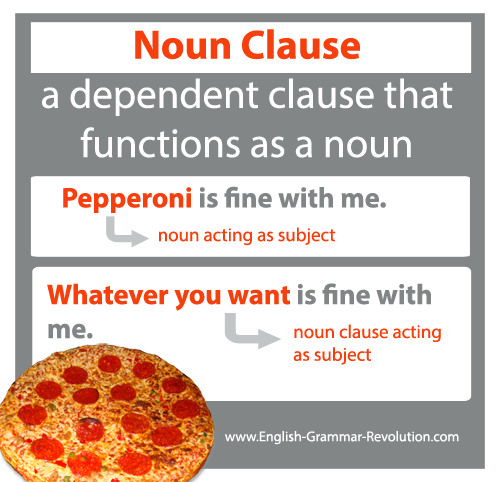
They can perform any of the noun jobs. We'll explore them acting as subjects, direct objects, objects of the preposition, and predicate nouns.
I'll show you what I mean.
We'll go through each of those noun jobs and you'll see what it looks like to have a whole clause acting as a noun.
Quick Refresher
A clause is a group of words with a subject and a verb. Subordinate clauses act as single parts of speech and are attached to independent clauses.
Noun Clauses Acting As Subjects
Subjects tell us whom or what a sentence is about, right? Right!
Candy is fine with me.
Candy is the simple subject in that sentence. It is one word acting as the subject. Now, check this out.
Whatever you want is fine with me.
Woo! Now there is a whole clause acting as the subject. Whatever you want is a noun clause acting as the subject of the sentence.
We know that whatever you want is a clause because it has a subject (you) and a verb (want). We also know that it is a subordinate clause because it does not express a complete thought.
Here is an example of how you would diagram a noun clause acting as the subject.
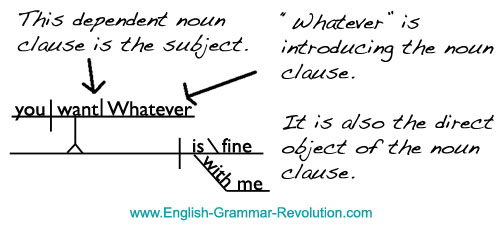
Acting As Direct Objects
A noun can also be a direct object. Direct objects receive the action of the verb. They are only used with transitive active verbs.
Can you tell me the time?
Time is the direct object in that sentence. It is one noun doing a noun job.
Can you tell me when it is time for dinner?
When it is time for dinner is now acting as the direct object. The whole clause is performing one function.
Let's see if when it is time for dinner is really a noun clause. Does it have a subject and a verb? Yes. (it & is)
Is it performing the job of a noun? Yes. It's the direct object of the verb tell.
Is it a subordinate clause? Yes. It does not express a complete thought.
Here is an example of how you would diagram a noun clause acting as the direct object.
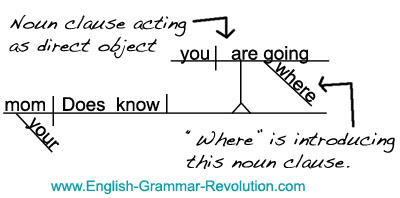
Here's a quotation from The Little Mermaid. It contains two noun clauses.
The prince asked who she was and how she came there.
She looked at him tenderly and with a sad expression in her dark blue eyes but could not speak.
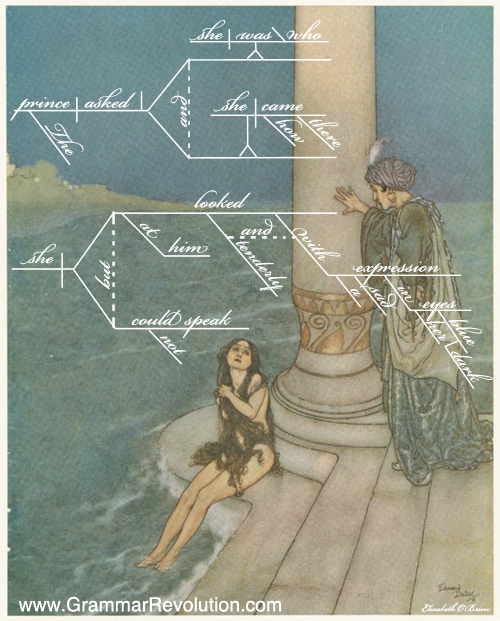
Diagramming Quotations
If you find yourself wondering how to diagram a direct quotation of someone's speech or writing, (direct speech) here's the answer!
Many times the person's quotation is a complete sentence.
For example, you might say...
Maria said, "I feel sleepy."
I feel sleepy is a noun clause acting as the direct object of the verb said.

Acting As Objects of the Preposition
As you might have guessed, an object of the preposition is another noun job.
Read this page about prepositional phrases if you need to brush up on prepositions.
I'm not interested in Tom.
Tom is a noun acting as the object of the preposition in.
I'm not interested in whatever Tom is selling.
Whatever Tom is selling is a clause acting as the object of the preposition. Tom is the subject of the clause, and is selling is the verb, so we know it is a clause.
It can't stand alone, so we know it is a subordinate clause.

Acting As Predicate Nouns
We've come to the last noun job that we'll discuss here. It has been waiting patiently while you read about subjects, direct objects, and objects of the prepositions.
This last job is, of course, a predicate noun.
If you want to sound smarter, you can also call these predicate nominatives.
Predicate nouns are the nouns that come after linking verbs. They rename the subject.
Happiness is warm pie.
Pie is the predicate noun. It is one noun performing a noun job.
Happiness is whatever just came out of the oven.
Whatever just came out of the oven is a noun clause performing the job of predicate noun.
It has a subject (whatever) and a verb (came), so we know it is a clause.
It does not express a complete thought, so it's a subordinate clause!
(Hmm ... pie sounds pretty yummy. I must be hungry as I write this!)
If you'd like to teach or learn grammar the easy way—with sentence diagrams—check out our Get Smart Grammar Program.
It starts from the very beginning and teaches you grammar and sentence diagramming in easy, bite-size lessons.

Hello! I'm Elizabeth O'Brien, and my goal is to get you jazzed about grammar.
I've never met anyone who was able to explain some of the most complex concepts as simply and precisely as you do. Thank you so very much for sharing your brilliance with us.
- Shirley, 4th-8th Grade English Language Arts Teacher
Hello Elizabeth,
Please let me share how helpful I have found your grammar and sentence diagramming material. It is such a pleasure to use the material with my son as I see how easily he grasps each concept and is able to apply it.
I sincerely appreciate the resources you have made available and wish you and your family all the best.
- Maggie, Homeschooler
This is original content from https://www.english-grammar-revolution.com/noun-clauses.html
Our Free Guide Gives You A Fun Way
To Teach And Learn The Basics v

Elizabeth O'Brien is the creator of Grammar Revolution.
Her lessons are guaranteed to give you more confidence in your communication skills and make you smile. :)
Other Helpful Resources

